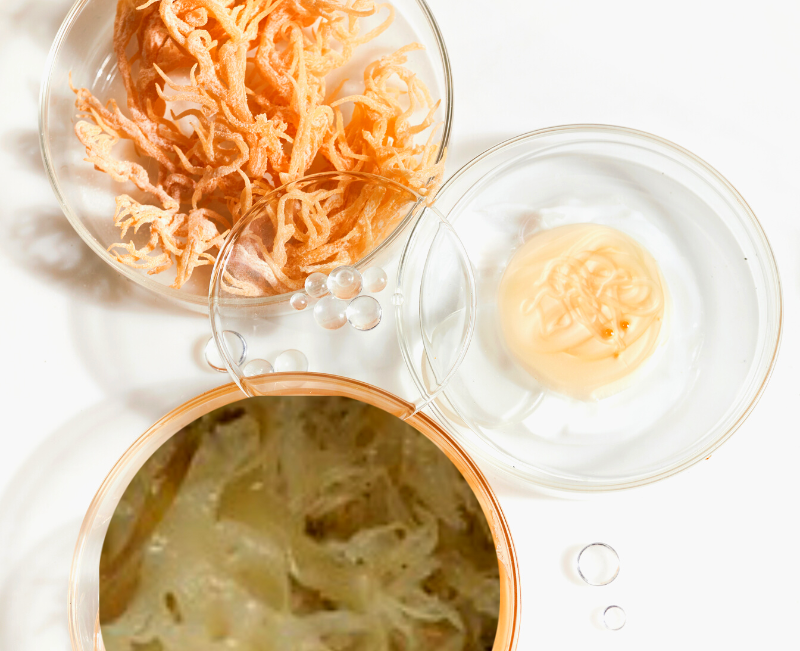Recent scientific research confirms that sea moss is a superfood packed with nutrients that offer numerous health benefits.
So join our experts on herbal supplements here at Herbsmedicine.net to find out more about this amazing plant and what it can do for you!
First, let’s start by finding out the mini answer.
Sea moss is a superfood and is good for many conditions including boosting your overall health and protecting your immune system. It is an excellent source of iodine which is important for thyroid health. Iodine is also beneficial for cognitive function, energy levels, and overall metabolism.
Ok so with the mini answer in place, let’s delve a little deeper and find out more about exactly what sea moss is.
What Is Sea Moss?
Sea moss, also known as Irish moss, is a type of seaweed that grows on the rocky coasts of the Atlantic Ocean.
It gets its name from its greenish-brown color and its ability to hold large amounts of water, which gives it a gel-like texture.
This seaweed is used in a variety of ways, including as a food additive, natural medicine, and cosmetics ingredient. It’s harvested by hand and has been used for centuries as a source of nutrition and healing.
Are Sea Moss and Carrageenan the Same Thing?
No, sea moss and carrageenan are not the same things.
Carrageenan is a processed form of seaweed that has been linked to digestive issues, while sea moss is a whole food that is rich in nutrients.
Carrageenan is processed by stripping away certain components of the seaweed, which can leave it with fewer health benefits.
Can Sea Moss Detox Your Body?
Sea moss has many health benefits, including the ability to detox the body, improve hair and skin health, and boost immunity.
This sea-born superfood can detox your body by binding to toxins and helping to remove them from your body
It can also improve skin and hair health by providing essential vitamins and minerals, as well as boosting immunity.
Registered dietitian and co-founder of The Food Trends, Ana Reisdorf, says that sea moss “may be one of the most nutrient-dense foods on the planet.” She adds that it is “a rich source of many vitamins, minerals, polyunsaturated fats, and anti-inflammatory compounds.”
What are the Benefits of Sea Moss for Your Skin?
Sea moss contains a wealth of vitamins, proteins, and minerals that can help keep your skin and hair healthy.
Its rich moisturizing properties come from its high levels of potassium chloride, which has been shown in scientific studies to help with skin conditions like eczema.
Here are some of the ways that Sea moss can help support skin health
- Reduces Inflammation
- Moisturizes the skin
- Heals wounds and scars
- Prevention of stretch marks
- Reduces fine lines and wrinkles
- Fades age spots
- Relieves eczema and psoriasis
- Soothes sunburns
- Reduces acne
What are the Benefits of Sea Moss for Your Hair?
- Moisturizes the scalp
- Prevents dandruff
- Conditions the hair
- Adds shine and luster to the hair
What Is Sea Moss Good for?
So, what is sea moss good for? Here are 17 potential benefits of sea moss
1. Boosts immune system
Sea moss is rich in vitamins A, C, and E, as well as several minerals that are essential for a healthy immune system, such as zinc and selenium.
Additionally, the anti-inflammatory properties of sea moss may help to reduce inflammation in the respiratory tract.
2. Fights infection
Sea moss has antiviral and anti-bacterial properties that may help fight off infections.
3. Reduces inflammation
The anti-inflammatory properties of sea moss may help to reduce inflammation throughout the body.
The anti-inflammatory properties of sea moss may help to reduce inflammation throughout the body.
This can lead to reduced pain and swelling in conditions like arthritis and asthma.
4. Aids digestion
Sea moss is a good source of fiber, which can help with bowel regularity and digestion.
Additionally, the mucilage in sea moss can help to soothe an upset stomach.
5. Relieves allergies
The anti-inflammatory properties of sea moss may help to reduce symptoms of allergies, such as runny nose, congestion, and sneezing.
6. Supports respiratory health
Sea moss is rich in vitamins A and C, both of which are essential for a healthy respiratory system.
7. Boosts energy
Sea moss is a good source of iron, which is essential for energy production.
Additionally, the B vitamins in sea moss can help to convert food into energy.
8. Improves digestion
Sea moss is a good source of fiber, which is important for a healthy digestive system. The anti-inflammatory properties of sea moss may also help to reduce inflammation in the digestive tract.
9. Promotes weight loss
The high fiber content of sea moss can help to promote weight loss by keeping you feeling full after meals and reducing cravings. Rich antioxidants in sea moss may also help to boost metabolism and burn fat.
10. Improves circulation
The iron content of sea moss can help to improve circulation by carrying oxygen-rich blood to cells throughout the body.
11. Boosts energy levels
Sea moss is a good source of iron, which is essential for red blood cell production and energy metabolism.
12. Strengthens bones
The calcium and phosphorus in sea moss can help to strengthen bones and prevent osteoporosis.
13. Relieves pain
The anti-inflammatory properties of sea moss can help to relieve pain and stiffness associated with arthritis and other inflammatory conditions.
14. Heals wounds
The antimicrobial and anti-inflammatory properties of sea moss make it an effective treatment for wounds.
15. Fights tooth decay
The minerals in sea moss can help to fight tooth decay and keep teeth healthy.
Ok, so what is it that makes sea moss such a well-being and overall health boost?
Find out more below.
What Is in Sea Moss?
Sea moss is nutrient-rich which helps support the skin and the immune system. According to research from Cleveland University, it can also help protect against heart disease by lowering cholesterol.
Iodine
Iodine is important for healthy thyroid function. It helps to regulate metabolism, body temperature, and hormonal balance.
Sea moss is unique for its iodine content, says Robin Foroutan, RDN, a registered dietitian with The Morrison Center in New York City.
Potassium
Potassium is an electrolyte that helps to regulate blood pressure and heart function. and also helps to maintain fluid balance in the body.
It is also involved in muscle contraction, nerve function, and blood pressure regulation.
Calcium
Calcium is essential for strong bones and teeth. It also helps to regulate muscle contractions and nerve function.
Magnesium: Magnesium is involved in energy production, DNA synthesis, and protein formation and is an important part of clinical medicine
Additionally, it helps to regulate blood sugar levels and blood pressure. Magnesium is a mineral that is also involved in many biochemical reactions in the body. It is necessary for energy production, muscle contraction, nerve function, and blood clotting.
Sulfur
Sulfur is important for the health of hair, skin, and nails.
It also helps to detoxify the liver and improve digestive function.
Chlorophyll
Chlorophyll is a plant pigment that has powerful antioxidant and anti-inflammatory properties.
Amino acids
Amino acids are the building blocks of proteins.
They are necessary for the growth and repair of tissues, and they also play a role in the production of hormones and enzymes.
Iron
Iron is a mineral that is necessary for the production of hemoglobin, a protein that carries oxygen in the blood.
This Iron is also involved in energy production, metabolism, and immune function.
Calcium
Calcium is a mineral that is necessary for the development and maintenance of bones and teeth.
It is also involved in muscle contraction, nerve function, and blood clotting.
Zinc
Zinc is a mineral that is involved in many biochemical reactions in the body
It is necessary for the development and function of immune cells, and it also plays a role in wound healing.
Copper
Copper is a mineral that is involved in the absorption and transport of iron in the body. It is also involved in energy production, collagen production, and antioxidant activity.
Selenium
Selenium is a mineral that is involved in the production of antioxidant enzymes. These enzymes protect cells from damage caused by oxidative stress.
Manganese
Manganese is a mineral that is involved in the synthesis of collagen and other connective tissues. It also plays a role in energy production, antioxidant activity, and blood sugar regulation.
Vitamin K
Vitamin K is a vitamin that is involved in blood clotting and bone health. It also plays a role in the absorption of calcium from the diet.
Other nutrients in this power-packed sea vegetable include:
- Phosphorus
- Sodium
- Chromium
- Molybdenum
- Vanadium
- Lithium
- Cobalt
- Flouride
- Dietary fibers
And to finish on…
So, we hope that’s given you lots of important information about sea moss and its power-packed benefits.
Sea moss is a nutrient-dense food that can be enjoyed in many different ways. It can be used to make smoothies, soups, or even added to baked goods.
To discover how to harvest and prepare sea moss, check out our other helpful article on Sea Moss.

